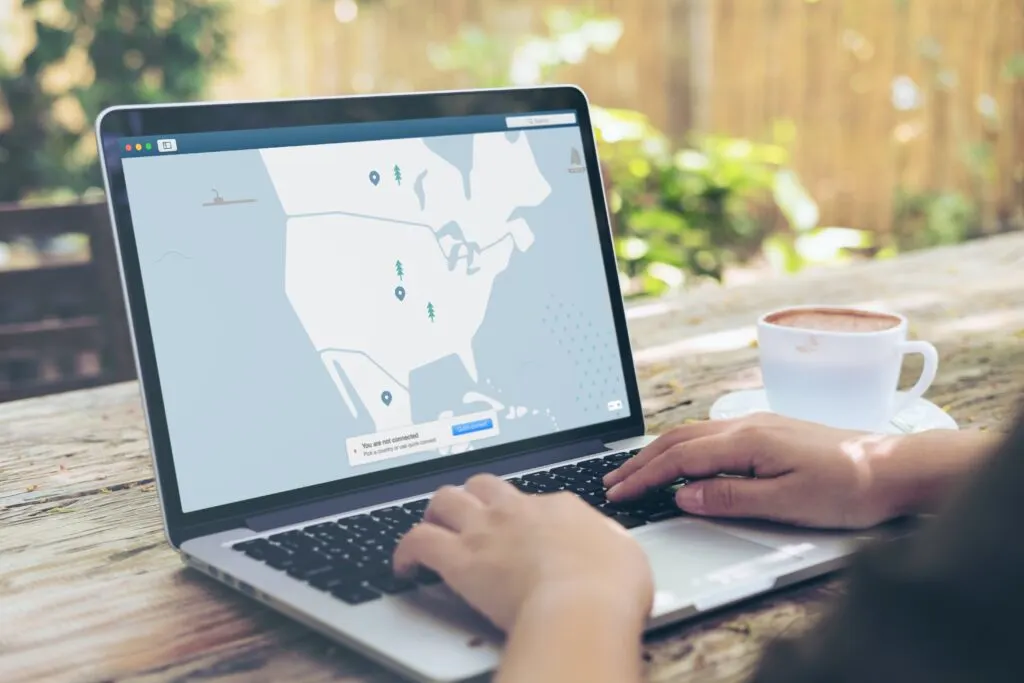Embark on your next adventure with confidence! Discover how a VPN for travel keeps your digital life secure and boundary-free, wherever your journey takes you.
The thought of traveling abroad sparks a sense of adventure and excitement. Exploring new cultures, tasting different cuisines, and exploring breathtaking landscapes are all part of the allure of international travel. However, amidst the thrill and planning, there’s one thing that is often overlooked: digital safety and freedom.

In today’s connected world, ensuring secure and unrestricted internet access is a must. From smartphones to tablets and laptops, we’re all connected when we’re traveling abroad. While this technology does simplify travel, it also brings its own set of risks. The dangers of using public Wi-Fi, well-known at home, become even more significant when you’re on the road.
Whether you are using a hotel’s wifi or your device’s hotspot, you need reliable and secure internet access. This is where a travel VPN comes into play, offering security and freedom in your online activities.
What is a VPN?
A VPN, or virtual private network, is an application that you can buy that runs on your computer or phone. It hides your actual IP address and encrypts your internet connection, ensuring your online activities remain private and secure.
It protects you from other users stealing your data, including usernames, passwords, credit card numbers, browser cookies, and other identifying information.
A travel VPN can go wherever you go and is designed to address the unique internet access challenges faced when not at home on a trusted network.
How Does It Work?
In short, a VPN works by creating a private network from a public internet connection. Using a VPN is kind of like sending your device’s data on a secret detour. This detour is the VPN’s server. Once online, your data goes through the VPN’s server before it hits the internet.
During this journey, the VPN replaces your actual Internet Protocol (IP) address with its own. Kind of like sending a postcard with a different return address than the address you are actually sending it from.
But that’s not all. The VPN for travel also encrypts your data which makes it unreadable to anyone who doesn’t have the special key to unscramble it. Only your device and the VPN server can read it, keeping your information secure and private.

How Do I Use a VPN?
Using a VPN for travel is easy: simply download the VPN app on your phone, laptop, or tablet, and open it once you’re online. In the app, you’ll find a list of servers, also known as endpoints. Pick a server location and within moments, all your data will be securely encrypted and routed through the VPN. You’re all set and secure.
The Benefits of Using a VPN for Travel
There are many benefits and advantages to using a VPN for travel and even while working from home.
Security
A VPN for travel secures your internet connection, protecting your personal information on public Wi-Fi networks and making it safe to use hotspots. This way nobody can access your emails, passwords, wallet app, boarding passes, smart IDs, or other personal information.
Enables Access
It allows you to securely access websites and post on any network anywhere, even if you’re in a country that has restrictive internet. For example, if you’re in a country that blocks Facebook, you can use the VPN to select a country where the website is available, and you will then be able to access the website without a problem.
Safely Access Online Banking and Prevent Frozen Accounts
When traveling, accessing online banking can become challenging. Many banking apps and online banking sites are designed to work only with your home country’s IP address. Without it, you could be locked out of your account or, even worse, have your account temporarily frozen – something none of us need to have happen while traveling!
Having a VPN for travel enables you to access your banking apps seamlessly by providing an IP address that aligns with your home country, ensuring uninterrupted and secure access to your finances no matter where you are.
Smooth Streaming
You can even use your VPN for travel to watch content on Netflix that may not be available where you are traveling because it has expired, has yet to be released, or because of licensing fees. A good VPN for travel can even help you stream your favorite movies and shows smoothly and without any buffering.
Save Money
Another little-known advantage of using a VPN is the possibility of saving money on fares and hotel rates. For example, if you’re shopping for the cheapest airline tickets, switching your location can give you access to rates that are limited to a specific country or region.

Choosing the Right VPN for Travel
When selecting the ideal VPN for your travels, there are many things you need to consider to ensure a smooth and secure online experience. Here are some key factors to consider:
- Device Compatibility: Be sure to check that the VPN is compatible with all the devices and operating systems you’ll use during your travels so you can use your laptop, smartphone, and tablet safely. Most good VPNs support Windows, macOS, Android, and iOS.
- No Device Limits or Extra Fees: On the same note, look for a VPN that allows multiple devices to connect simultaneously and without any extra charges. All types of devices are vulnerable on insecure networks and you’re not going to want the hassle of constantly switching between them. Nor do you want to pay extra fees for using different devices. So be sure to choose a service that supports several simultaneous connections without an extra charge.
- Look for Decent Speed: It’s normal for a VPN to reduce your internet speed a bit since your data is being rerouted through a different server instead of going directly to its destination. How much it decreases depends on several factors like the server’s distance, bandwidth limits, and network congestion. Therefore be sure to compare speeds before making your selection.
Pro tip: Use a trial version of the VPN before paying for it, and run speed tests to see just how fast or slow it is.
- Security and Privacy: Ensure that the VPN service you choose uses strong encryption methods (AES-256 bit is the industry gold standard) for your data. This is important to prevent cybercriminals from accessing your sensitive information if there’s ever a security breach. Also look for a no-logs policy, and a kill switch, which, if the connection drops, will stop all internet activity until the VPN connection is back. This is important, because some VPNs may not alert you that the connection has dropped exposing your data.
- Server Network: Choose a VPN that has a large number of server locations in as many countries as possible. This benefits you in several ways. First of all, it allows you to connect to servers in different countries and access content from anywhere. It also ensures your communications remain secure until they reach the selected country. Plus, having more server locations means less strain on each individual server, leading to faster speeds for all users and more dependable access regardless of your location.
Pro Tip: Double-check the VPN’s server coverage list to make sure it has servers in your specific vacation destination, too..
- Go with a Trusted Provider: It is imperative to choose a reputable VPN provider. Established companies offer reliability and trustworthiness. They offer better security and often have more servers. Always check user reviews and put your privacy over cost when choosing the best VPN for travel.
- Reasonable Pricing: Speaking of cost, look for competitive pricing and a money-back guarantee, In general, a good, secure VPN service costs between $9-15 per month. Remember, let the provider’s reputation and the features they offer guide your decision, rather than just the price.
- Trial Periods: A trustworthy VPN provider should offer a no-risk trial and some type of money-back guarantee. As you assess its performance, remember to check those speeds.
- Ease of Use: The best software in the world is useless if it is difficult to install or not user-friendly. Look for a VPN that has a user-friendly interface, especially when it comes to installation, getting updates, and ease of use. This is even more important if you are new to VPNs. Taking advantage of free trials and reading user reviews are key to helping you determine ease of use.
- Customer Support: Technical issues are the last thing you want to deal with while traveling. That’s why it is important to choose a VPN for travel that offers dependable customer support 24-7. This way you can get help quickly if you encounter any problems. Pro Tip: read reviews to gauge the VPN’s customer service responsiveness.
- Steer Clear of Free VPNs: While everybody loves free things and saving money, free or cheap isn’t always better. Especially when it comes to VPNs. Free VPN services have lower levels of security and encryption and come with many limitations. Bandwidth is often limited and overcrowded resulting in slower speeds. It’s worth investing in a paid service for the added security and peace of mind.
By keeping these points in mind, you can select a VPN that not only enhances your travel experience but also ensures your online activities remain private and secure.

Conclusion
In conclusion, a VPN for travel is an essential tool for any savvy traveler. It’s not just about staying connected; it’s about ensuring your online safety, privacy, and access to your favorite content, no matter where you are. From smooth online banking and streaming to possible savings on travel bookings, the benefits of a VPN for travel are numerous and impactful.
When choosing the right VPN, remember to prioritize factors like device compatibility, speed, strong security features, and reliable customer support. Steer clear of free VPNs, as they often compromise on security and performance. Selecting a reputable provider with a user-friendly interface and reasonable pricing will ensure your travels are both enjoyable and secure.
Remember, a VPN for travel is less of a luxury and more of a necessity in today’s connected world.
